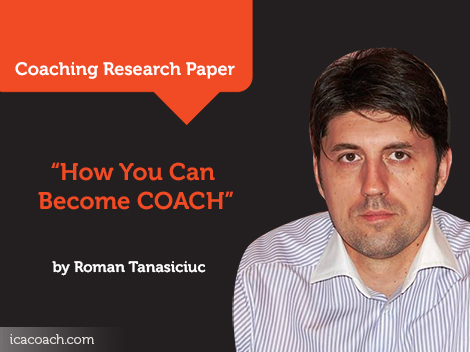
Research Paper By Roman Tanasiciuc
(Life Coach, ROMANIA)
I want to start with a very important fact- anyone can find the way to become a good coach.
If you choose the coach job in order to get rich or to make a huge profit, it’s useful to know that the learning process takes time; sometimes this goal will be reached after several years. You need financial resources to sustain yourself all this time. You can make money easily if you choose to become an entrepreneur and you find yourself a good coach that will lead you in this direction.
If you’ve chosen this job because you want to leave the past behind and you want to make a change, it’s good to know that all the information you’ve accumulated until present time it’s neither good or bad. You just need to learn how to transform this inheritance into a stepping stone to success.
If you want to be independent, the coaching job fully offers you this possibility. But be aware that being independent means that you are in the same time the leader/ boss and the only employee of your own company. The learning process consumes many resources, and the time is one of the. You will be confronted with many lonely times and a lot of stress. You can be at one point the coach of someone that needs help in developing his own success and performance. In this situation, the coaching process is in fact an intuitive extension of the job you’ve been practicing before. For these persons, the transition is much easier and comes in stages.
In fact, the first message I’ve received when I begun my coaching experience was that: “there isn’t a perfect recipe. There are emotions, feeling, various experiences, and different situations. All these can motivate the ones that want to become coach to find alone their own way.”
In order to be coach you have to develop and maintain a good relationship with the coached person along the entire process. Silence, Listening, Position, Body Language, Voice Inflection (Verbal Punctuation), Resume Keywords, Validations, Request Permission, Humor, are only a part of the competencies described in this chapter. In the hands of a competent coach, these instruments will be helpful for the client in order to build his own developing, creation and discovery space. Each of these competencies help you become efficient in coaching, only with the condition that the client will progress and develop independent. The first instruments of coaching are in fact efficient communication instruments.
The client’s performance is actually a consequence of coaching. “The Accompanied dialogue” of the client allows him/her to express in a new reference frame, created by him/ her. This “accompanied dialogue” is in fact a step through which the client is building new foundations, discovers and develops for himself/ herself a identity, he/ she grows and becomes a performance entrepreneur.
In order to succeed as coach, it is highly necessary to work with the client in creating new perspectives. The accompanying and guidance offered to the client, as coach, must not contain specific answers or suggested answers. The coach is helping the client to find solutions alone, by asking him/ her the right questions at the right moment. In 4th chapter of the book you will find some interesting ideas regarding the form and the meaning of questions used by coach while working with his client. Depending on the type of questions and especially depending on their final objective, we can make the difference between coaching, a police investigation or a journalist interview. The art of asking the right questions is the key needed by most of coaches. With minimal percussive questions, the coach can help his client to express his entire potential, to develop new frontiers for his business.
In order to discuss about coaching sessions, we must establish first an efficient and coherent collaboration with the client. The multiple levels of agreement available in coaching help you to define a route to follow along the coaching process. These are more some operational and punctual agreements unlike the legal agreement, which formally defines coaching relationship. A coach will have to establish the following type of contracts and explicit agreements: Contract Approach, Agreement Meeting, Sequence Agreement, Punctual Interventions Agreement, Agreement of Practical Work, and Confrontation Agreement. All these agreements are part of each coach key competences.
I already am counting my first year of learning about coaching- if I should make a short conclusion, I should say something like this: “The coach job is about relations and about contact. If you want to succeed, you need to provoke the clients in face-to-face meetings, where your main goal is to earn their trust. Build real relations, listen to your clients, but never offer those options or solutions!”
Coaching is not an expert approach. No matter if it’s about an individual, a team or an organization, the job is focused on evolution and transformation of the frame of reference of the persons or groups that want this thing, by taking in consideration the interferences of the environment in which they perform.